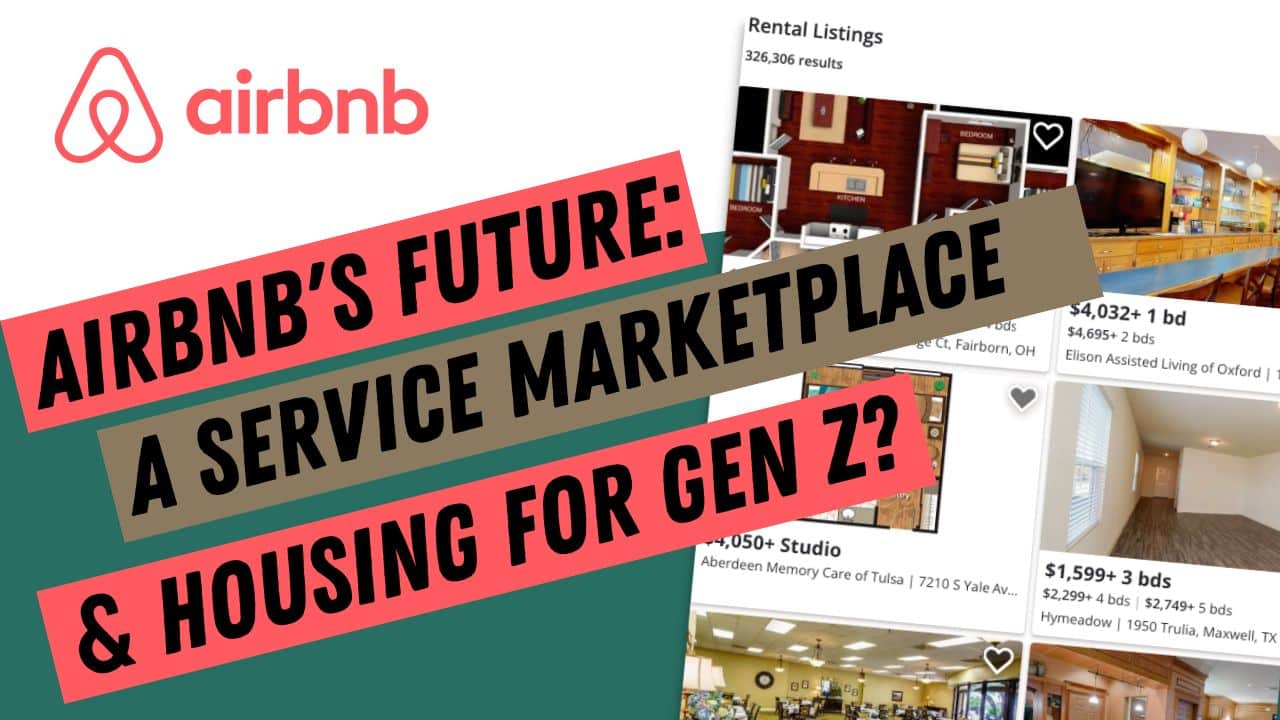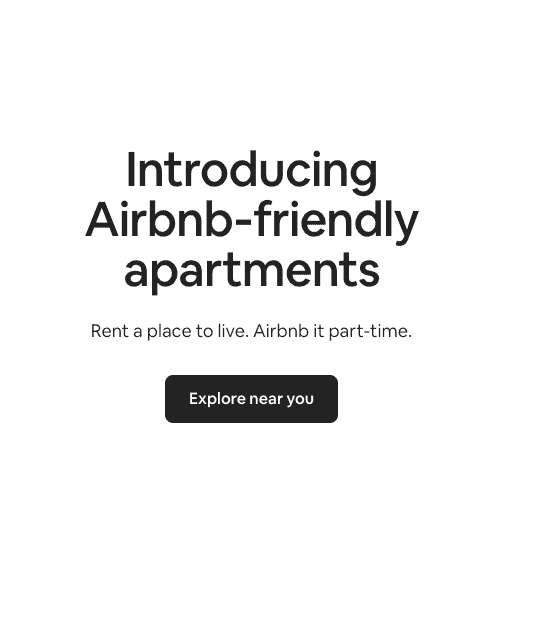Airbnb was once a simple travel marketplace, connecting travelers with unique accommodations around the world. But today, the company is branching out into new territory, focused on inspiring, matching, and connecting people beyond just finding a place to stay. With a strong emphasis on trust-building between strangers and a growing appeal among Gen Zs, Airbnb is poised for a future that could include everything from short-term stays to long-term housing subscriptions. In this analysis, we’ll explore what Airbnb was before the pandemic, what it has become today, and what its immediate future may hold as it expands its offerings beyond traditional home-sharing. The company is also looking to add revenue streams that are more usual to large platforms, such as sponsored listings and ad network. Yet, the latter is not a priority.
In March 2023, Brian Chesky, the CEO of Airbnb, participated in a Technology Media & Telecom Conference organized by Morgan Stanley. The complete transcript of his interview is available here. I summarized the significant points while linking them to the latest Airbnb products and programs. In an attempt to expand beyond its traditional business of short-stays in large cities for two people, Airbnb has set ambitious goals for 2023.
Although Airbnb’s PR team meticulously crafts the outline of such speeches, it provides insights into their plans. As the company releases two major updates every year, with the next one scheduled for May, Brian Chesky has begun hinting at what we can expect from this release.
What was Airbnb before the pandemic?
To summarize Brian Chesky’s thoughts about what Airbnb was before the pandemic outbreak, the company’s previous core business model could be summarized as follows:
- Focused on budget travel with accommodation prices averaging $100-$110 per night.
- Most (80%) of its business came from urban trips or cross-border/international travel.
- Limited presence in vacation rental markets, with most listings located in urban areas.
- Airbnb did not have much penetration at higher-end price points.
- Primarily targeted short-term stays rather than mid-term or long-term rentals.
What is Airbnb today? A Company Moving Beyond A Travel Marketplace with a Focus on Inspiring, Matching, and Connecting.
Brian Chesky basically says that Airbnb has evolved from being just a travel marketplace. Instead, it now focuses on inspiring, matching, and connecting people.
- Providing inspiration to their users about where to go,
- Matching guests with the right listings,
- and Establishing a system of trust to get strangers to live together.
Airbnb is in the business of inspiring
Airbnb Categories is a strategic tool that Airbnb uses to position itself at the top of the travel funnel. By prominently featuring this tool in its homepage design and advertising campaigns, Airbnb encourages users to come back often to explore and dream about new destinations. The focus on inspiration rather than just transactions is part of Airbnb’s strategy to become more than just a platform for booking vacation rentals.
Airbnb wants to be known as a place where users can come early in their travel planning process when they are still open to many options. By doing so, they aim to increase the number of users who visit their platform (app and website) and plant a seed in their minds that Airbnb is an excellent place to book when they have progressed further down their decision-making process. This approach helps Airbnb build brand loyalty and increases user engagement with the platform, ultimately benefiting hosts by driving more bookings.
In short, Airbnb Categories is a powerful illustration of how Airbnb wants to be top-of-mind for travelers throughout their entire journey – from initial inspiration all the way through booking – and is a key component of their overall growth strategy.
Airbnb is in the business of matching
Matching Guests and Listings
Matching guests with the most suitable listings is a critical factor for success in any two-sided marketplace, and Airbnb is no exception. With 6.6 million listings, it’s essential for Airbnb to effectively match supply and demand while ranking listings in a way that resonates with users and generates revenue for the platform.
The Power of Machine Learning
To achieve this, Airbnb and its competitors utilize machine learning – an artificial intelligence technique that enables computers to learn from data without explicit programming – to make informed decisions about which listings to feature on their homepage, within categories, or in response to specific search requests. We showed and analyzed some examples of how Airbnb uses Machine Learning and rules to categorize listings and rewrite listing titles.
Adding Value with AI-powered Language Models
However, AI-powered language models like ChatGPT can add more value to Airbnb’s matching algorithm. For instance, Brian Chesky says that they could analyze Airbnb’s half-billion reviews to summarize them and extract crucial insights that could enhance the accuracy of their matching system. With these advanced technologies at its disposal, Airbnb can continue refining its matching algorithm and offer an unparalleled user experience for both hosts and guests.
Expanding Categories Requires More Data Analysis
As Airbnb expands its supply categories with offerings such as Luxe (luxury), mid-term stays, and housing options, the platform must rely even more heavily on data analysis and machine learning to match guests with the right listings successfully. Each new category brings unique user preferences, search behaviors, and listing characteristics that must be considered in providing accurate recommendations. By analyzing guest and listing data at scale, Airbnb can gain valuable insights into these nuances and optimize its matching algorithm accordingly.
Airbnb is in the business of establishing a system of trust to get strangers to live together.
Airbnb is in the business of trust, from host reviews to guest background checks
Airbnb has been in the business of creating trust for a long time. In a 2026 TedX speech titled “How Airbnb Designs for Trust,” Joe Gebbia, the co-founder of Airbnb, shared how he bet his whole company on the belief that people can trust each other enough to stay in each other’s homes.
Gebbia said that he overcame the stranger-danger bias by using good design to create a system of trust. Then, he set out his dream for a culture of sharing where design helps foster community and connection instead of isolation and separation.
Today, Airbnb has been busy rolling out:
- Airbnb runs background checks on guests
- In 2023, the company will require all users booking reservations on its platform to verify their identity to book a reservation.
- Airbnb employs risk detection technology to prevent parties and gatherings at its rentals.
- Airbnb globally bans party houses.
- Young travelers under 25 are not allowed to book a property for the same day in the city where they live.
- Airbnb suspends and removes listings that violate its policies.
Some users may wonder whether it is normal that a platform like Airbnb can decide to cancel an existing booking based on extensive background checks. However, the company sees it as an achievement. Brian Chesky says it is a free service that the company provides to hosts.
Airbnb is for finding a place where to live
Airbnb has evolved from a travel platform to a marketplace allowing strangers to live together. Therefore, using the verb “to live” is crucial as it highlights a key direction for Airbnb.
Since the pandemic, Airbnb has launched projects such as “Live and Work Anywhere on Airbnb“ and promoting mid-term and long-term stays. However, the most significant development is the launch of an Airbnb-friendly apartment marketplace in late 2022. This showcases the company’s departure from being just a travel marketplace.
The new marketplace offers renters looking for a place to live access to over 175 buildings across 25+ markets in the US. Once renters choose their desired apartment, they can list it on Airbnb to offset some of their rent costs. This partnership with apartment buildings makes it easier for renters to find apartments that allow hosting on Airbnb part-time. In addition, renters can explore these buildings and learn about their potential earnings from hosting their homes on Airbnb.
Overall, Airbnb’s evolution into more than just a travel platform shows its commitment to creating a community where strangers can trust each other enough to live together.
What Airbnb is not: Booking.com!
Brian Chesky, the CEO of Airbnb, indirectly highlighted the differences between his company and other travel platforms, focusing on Booking.com, the industry leader.
He mentioned four things Airbnb does not want to do, as he believes they are mistakes made by competitors.
- Flights:
Firstly, while Booking.com has been gradually introducing flight bookings to its platform as part of its Connected Trip strategy, Chesky disagrees with this approach. Instead, he believes inspiring people about travel destinations should be the top priority because travelers need to decide where to go before figuring out how to get there. - Iterative A/B testing:
Secondly, Chesky criticized A/B testing as a recipe for slow progress and clunky design. He alluded to how Airbnb follows a single roadmap for the whole company and has rolled out 300 new features (see Winter and Summer Releases) in two years compared to competitors whose apps seem stagnant. - Loyalty program:
Thirdly, Booking.com’s Genius loyalty program is one of the most powerful in the industry. Airbnb will not offer a loyalty program. Chesky believes building a product customers love is more important than paying them through a loyalty program. Vrbo is rolling out its own loyalty program in 2023. - Dependency on Google Adwords:
Booking.com is known for its impressive ability to purchase traffic through millions of keywords on Google, successfully converting that traffic into bookings and earning close to 45% margins. But, according to Brian Chesky, relying heavily on costly marketing campaigns is akin to being addicted to drugs. When faced with the worst of the pandemic, he made the difficult decision to cut all marketing expenses and was surprised to find that it had no impact on the business. As a result, he’s now prioritizing efforts towards building a strong brand and investing in public relations.
What is Airbnb’s immediate future?
Here are our bets on Airbnb’s plans to expand beyond its core, as announced in its 2023 strategy. We may be wrong, but it is a great exercise to look at what Airbnb has already released and use some directions shared by Brian Chesky to imagine new services.
A Zillow-like platform where Gen Zs can find places for short-stays and long-term housing? With a subscription model?
Airbnb could become a platform that caters to young adults seeking short-term stays and long-term housing solutions. Airbnb may offer more diverse housing options on its platform for extended periods (not just weeks) and introduce a subscription model that allows young people to stay in one city for several months before moving on to another location.
From offering housing listings, developing a subscription model to house digital nomads, to matching roommates to share apartments for a whole college year, Airbnb has multiple options to expand.
Powerful with Gen Zs
With 62% of Airbnb’s guests under the age of 34, this demographic faces a significant housing crisis and often still lives with their parents. Additionally, many young people are comfortable with remote work, making them an attractive target for Airbnb’s services.
Airbnb-friendly apartments marketplace
Airbnb has already developed a second marketplace where tenants can find apartments that are friendly to the platform. This suggests that they may be looking to expand their offerings in this area.
Airbnb Live and Work Anywhere
In 2022, Airbnb introduced the “Airbnb Live and Work Anywhere” initiative along with several Remote Work Hubs worldwide. This program involves collaborating with local authorities to promote destinations that are friendly to remote work and digital nomads. In his speech, Chesky said that, if he were 23, he would be flexible, work remotely, and hop from one place to another.
Get strangers to live together.
Brian Chesky has emphasized his desire to establish trust between strangers living together, which could make it easier for young people to find roommates or housemates on the platform.
Overall, we believe that Airbnb’s expansion plans will focus on meeting the needs of younger users looking for flexible housing options during a period of significant economic uncertainty. From offering housing listings to developing a subscription model for digital nomads to matching roommates to share apartments for a college year, Airbnb has multiple expansion options.
A marketplace place of free and paid services for hosts and guests?
Airbnb may create a marketplace of free and paid services for hosts and guests. The company previously tried to create a marketplace for hosts called Host Assist, which offered a collection of apps designed to simplify sharing space with guests. Although this initiative is currently on hold, it could serve as a foundation for the development of the Airbnb Marketplace discussed below:
- Like how people can download apps from the Apple App Store, hosts and guests could add free and paid services from an “Airbnb Marketplace.”
- Airbnb wants to create a “moat” by providing more free services to hosts, such as background checks performed at no cost.
- Brian Chesky has emphasized his desire to increase the value delivered to hosts so that they do not leave the platform. He wants the deal for hosts to feel cheaper every year by giving away more value than what is charged.
- Airbnb plans on offering paid services provided either by itself or by third-party companies.
- According to Chesky, a significant opportunity exists for a suite of services that could be offered through an “app store” for third-party providers. Thousands of companies are already built on top of Airbnb, and billions of dollars flow through them (think of the whole vacation rental tech ecosystem)
- Airbnb has already launched a paid travel insurance product provided by large insurance companies in several countries.
To sum up, Airbnb is looking for ways to add more benefits for both hosts and guests, and they are also exploring new opportunities to make money through paid services.
Sponsored Listings and Ad Network Take a Backseat as Airbnb CEO Prioritizes Immediate Needs
Airbnb’s CEO, Brian Chesky, has discussed the possibility of launching sponsored listings and an ad network to increase revenue streams. Chesky sees sponsored listings as a massive opportunity and notes there are no hurdles to implementing them. The company could easily add a few percentage points to its take rate by scaling sponsored listings over time, similar to successful platforms like Amazon.com, Etsy, Alibaba, and Booking.com. However, Chesky believes these revenue streams are non-perishable opportunities that can be pursued anytime. He wants to prioritize the most perishable opportunities first, which are initiatives that will immediately impact the business.
Chesky’s interest in creating an ad platform for Airbnb that enhances the user experience is evident. He emphasizes the importance of carefully turning the dial on ad placements to avoid overwhelming users with too many ads. By implementing these strategies carefully, Airbnb can create new revenue streams while being mindful of user experience. This approach could ultimately lead to increased engagement and loyalty from its users.
Airbnb may not want to emulate Booking.com, but it does envy its competitor’s ability to collect advertising fees from its Booking Network Sponsored Ads, which operate on a CPC (cost-per-click) basis. Booking.com’s Preferred and Booster programs, which enable properties to get upranked in search results, are commission-based and have been criticized for exploiting hosts for profit. Despite this, Booking.com’s successful advertising strategy may offer valuable insights for Airbnb as it explores its own advertising revenue options.
Overall, Airbnb’s desire to increase its revenue streams while being mindful of user experience is commendable. The company’s cautious approach to launching new revenue streams shows that it values user satisfaction and is committed to long-term growth. By prioritizing the most perishable opportunities first, Airbnb can remain agile and responsive to changing market conditions while driving growth and success in the long term.
Conclusion: What is an Airbnb for?
In conclusion, it’s essential to acknowledge that while we’ve presented some possibilities for the future of Airbnb, the reality is that nothing is still being determined. As with any company, there is a multitude of factors that could impact its trajectory in unexpected ways.
For example, while we suggested that Airbnb could launch a subscription model for digital nomads, it’s worth noting that this is an idea that several startups have attempted and struggled to pull off successfully. The logistics of such a model – from ensuring reliable Wi-Fi connections to providing comfortable workspaces – are complex and require significant resources. Additionally, there may be unforeseen challenges related to regulatory compliance or local laws.
Similarly, while building a service marketplace for hosts and guests may seem like a logical next step for Airbnb, the failure of Host Assist highlights the difficulties inherent in creating such a platform. Establishing third-party connections and developing a marketplace similar to existing PMSs requires significant investment and expertise.
Ultimately, it’s impossible to predict with certainty what path Airbnb will take in the coming years. The company may focus on its core home-sharing business or explore entirely new avenues altogether. In addition, external factors – such as changes in travel patterns or shifts in consumer preferences – could impact the company’s growth trajectory in unexpected ways.
What is clear is that Airbnb has demonstrated an ability to innovate and adapt over time. From its early days as a scrappy startup disrupting the hotel industry to its current status as one of the most recognizable brands in travel, Airbnb has shown a willingness to take risks and push boundaries. Whatever comes next for this dynamic company will undoubtedly be fascinating to watch unfold.








